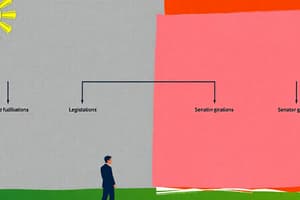Podcast
Questions and Answers
What is the political significance of senatorial courtesy?
What is the political significance of senatorial courtesy?
Senatorial courtesy is an agreement among senators to not vote for a nominee opposed by senators from the nominee's home state.
Why have Supreme Court nominations and confirmations become so political?
Why have Supreme Court nominations and confirmations become so political?
Supreme Court nominations are a president's lasting legacy and are determined by party identification, ideology, etc.
On what basis does a President pick his nominees? How might this vary according to the make-up of Congress?
On what basis does a President pick his nominees? How might this vary according to the make-up of Congress?
A president picks nominees based on party identification, party ideology, judicial philosophy, qualifications, age, and gender.
What is important about the way the Supreme Court chooses its cases?
What is important about the way the Supreme Court chooses its cases?
Why do critics of judicial activism claim that it is undemocratic?
Why do critics of judicial activism claim that it is undemocratic?
How have the Warren, Burger, Rehnquist, and Roberts courts reflected the competing philosophies of judicial activism and judicial restraint?
How have the Warren, Burger, Rehnquist, and Roberts courts reflected the competing philosophies of judicial activism and judicial restraint?
What is original jurisdiction?
What is original jurisdiction?
What is appellate jurisdiction?
What is appellate jurisdiction?
What is a dual court system?
What is a dual court system?
What is senatorial courtesy?
What is senatorial courtesy?
What is a majority opinion?
What is a majority opinion?
What is a concurring opinion?
What is a concurring opinion?
What is a dissenting opinion?
What is a dissenting opinion?
What are precedents?
What are precedents?
What does stare decisis mean?
What does stare decisis mean?
What is original intent?
What is original intent?
What is judicial activism?
What is judicial activism?
What is judicial restraint?
What is judicial restraint?
What are class action suits?
What are class action suits?
What is judicial construction?
What is judicial construction?
Flashcards are hidden until you start studying
Study Notes
Political Significance of Senatorial Courtesy
- Senatorial courtesy allows senators to block judicial nominations if opposed by senators from the nominee's home state.
- This practice is significant as it enhances the role of state senators in the nomination process, requiring alignment of party between the president and the senator.
Supreme Court Nominations and Political Context
- Nominations are highly politicized as they represent a president's lasting influence on the judiciary.
- Factors influencing nominations include party identification and ideological alignment, with strategic retirements planned around party control.
Criteria for Presidential Nominees
- Presidents select nominees based on party alignment, judicial philosophy, qualifications, and demographic factors like age and gender.
- The makeup of Congress can impact the nomination process, particularly regarding support for nominees' political ideologies.
Case Selection by the Supreme Court
- The Supreme Court chooses cases primarily based on appeals from lower courts, determining which cases warrant hearing and trial.
Critiques of Judicial Activism
- Critics assert that judicial activism undermines democracy by prioritizing the decisions of judges over the will of the people.
- Historical perspectives, like those of the Warren Court, illustrate tensions between advancing equality and adhering to constitutional interpretations.
Evolution of Judicial Philosophies in Supreme Courts
- The Warren Court was characterized by liberal activism and loose constructionism.
- The Burger Court was more divided but still leaned towards loose constructionism.
- The Rehnquist Court emphasized judicial restraint and strict constructionism, often favoring conservative views on social issues.
- The Roberts Court exhibits a blend of restraint and liberal tendencies among conservative judges.
Jurisdiction Types
- Original jurisdiction refers to a court's authority to hear a case for the first time.
- Appellate jurisdiction allows a court to review decisions made by lower courts.
Dual Court System
- The United States operates a dual court system, consisting of both federal and state courts, which handle different types of cases.
Key Judicial Opinions
- Majority opinion reflects the views of the greater part of the court.
- Concurring opinion agrees with the majority but presents different reasoning.
- Dissenting opinion expresses disagreement with the majority ruling.
Legal Principles
- Precedents are past legal cases that serve as guiding principles for current cases.
- Stare decisis is the doctrine emphasizing adherence to established precedents to maintain legal consistency.
Judicial Interpretation Theories
- Original intent theory posits that justices should interpret the Constitution based on the Founders' intentions.
- Judicial activism advocates for interpreting the Constitution concerning contemporary conditions and societal values.
- Judicial restraint encourages judges to limit their power and defer to existing laws.
Class Action Suits
- Class action suits allow a small number of individuals to sue on behalf of a larger group facing similar circumstances, enhancing access to justice.
Judicial Construction
- Judicial construction involves interpreting legal documents to ascertain their intended meanings and applications.
Studying That Suits You
Use AI to generate personalized quizzes and flashcards to suit your learning preferences.



